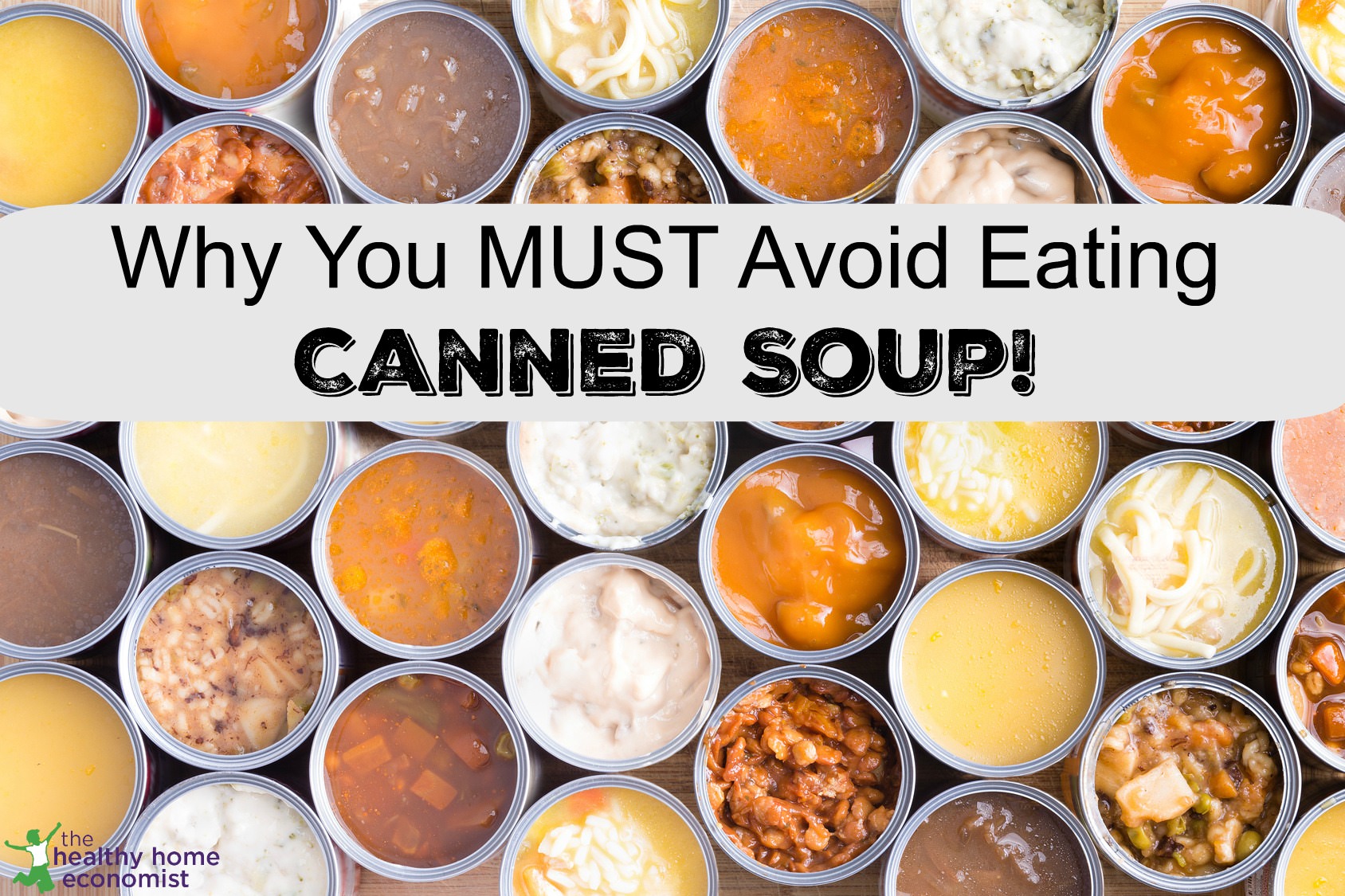
Attention! Class is about to begin.
Let’s get started with today’s lesson in healthy living. Operation Take Back Your Health is now underway:
Step 1: Walk to your kitchen pantry and open the door.
Step 2: Remove all canned foods especially canned soup. Yes, even the organic ones.
Step 3: Throw them in the trash.
Yes, the trash. That’s where they belong. Don’t give them away as this is simply passing on the curse of ill health to another unsuspecting soul.
Step 4: Do your very best to never, EVER buy anything in a can again.
Well done. Class dismissed.
Canned Soup Risks Toxic Chemical Exposure
If you’ve been a reader of this blog for any length of time, you know that canned food is something that is very much a detriment to your health. The reason is not just because the food is nutritionless due to the high temperatures and pressures required during processing.
Possibly the most worrisome problem of all is that almost all brands of canned food, except for a very few organic ones, contain the endocrine disruptor bisphenol A. This chemical, better known as BPA, is part of the can lining. It is a byproduct of the chemicals used to prevent corrosion. Those that don’t contain BPA contain a very similar chemical known as BPS, which is just as dangerous!
Why are BPA and BPS such a HUGE, HUGE problem, particularly for our children?
Because they are linked to massive hormone disruption with the serious problem of early puberty, ADHD, obesity, Type 2 diabetes, and the list goes on and on and on.
Think this problem is overblown? Consider this.
Currently, as many as 10 in 100 white girls, 15 in 100 Hispanic girls, and 25 in 100 African American girls are experiencing breast development as early as 7 years old! The earlier a girl goes into puberty, the higher her chances of breast cancer later in life.
Canned Foods Much Worse Than Previously Thought
Now comes the news that the BPA in canned foods raises urine levels of this dangerous chemical much more than previously believed.
In a study published yesterday in the Journal of the American Medical Association, participants who ate canned soup every day for only five days had urine levels of BPA that were 1,221% higher than those who instead ate soup made with fresh ingredients and homemade broth.
Karin Michels, an associate professor of epidemiology at Harvard University and leader of the study, said, “To see an increase of this magnitude was quite surprising.”
Michels added, “We are concerned about the influence of [hormone-disrupting] chemicals on health in general, and BPA is one of them.”
The study included 75 people whose average age was 27. Progresso was the only brand of soup that was tested. This is the first study to actually measure the BPA levels in urine using randomized participants eating food that was either canned or fresh.
BPA in Mom’s Urine Risks Health Problems for Unborn Children
Study researcher Jenny Carwile, a doctoral student at Harvard made the following observation.
We’ve known for a while that drinking beverages that have been stored in certain hard plastics can increase the amount of BPA in your body. This study suggests that canned foods may be an even greater concern, especially given their wide use.
A number of studies have linked BPA with a host of health problem. In 2008, a study of 1,455 participants showed that higher urine levels of BPA were linked with higher cardiovascular disease, diabetes, and abnormal liver enzymes even when factors such as smoking and age were taken into account.
Other studies have shown a correlation between BPA in a pregnant woman’s urine and resultant health problems in her child.
How much more evidence is needed? Wise shoppers who are truly concerned about the health and the potential for estrogen dominance from exposure to BPA will consistently bypass all canned foods on their trips to the supermarket or the health food store!
Have no idea how to make fresh soup? Relearn this traditional culinary wisdom by learning how to make homemade stock and bone broths as an important first step.








It’s disappointing that Progresso/General Mills financially supported Hillary Clinton in her bid for President. Why would Mrs Clinton receive funds from a company that doesn’t have a handle on the BPA problem ?
BPA isn’t linked to ADHD at all. Why do people keep blaming ADHD and autism over these little things?
It’s not the chemicals in the can that is the killer. It’s the SALT in the soup. One can of soup has more than an entire day’s allowance of sodium. I suffered the consequences of eating lots of soup–ending up in the hospital with 3 liters of fluid on the lungs–I was drowning in my own fluids. I was consuming over 6000 milligrams of salt A DAY, mainly from eating a couple of cans of soup a day. I was losing weight nicely, but killing myself in another way. Even lower sodium soups have more than really good for you.
So even if you find cans without BPA (Including Amy’s Organic), they’re way overdone with salt!
You should try Amy’s line of soups. All organic and no BPA lining. Super happy I found it.
I know I’m late to the conversation but I am not afraid to admit that my family still eats canned food. Not every single day but at least once a week we eat canned soup and tuna. When I was pregnant with my daughter I had horrible morning sickness and fatigue. One of the few things I could eat was chicken noodle soup in a can and canned tuna. I worked full time then so I never took the time to make homemade soup. My daughter is nine now and she is not developing breasts! She absolutely no developmental problems or behavior problems. As a matter of fact she has been in her top reading group in her class for years and is always one of the best behaved students. My son is six years old and has tested advanced. I am very interested in moving away from processed foods and that’s why I read this article. However, I do not think that an alarmist attitude needs to be taken and I think this post does just that. The author claims girls are developing breast at 7 yet she does not site where she got this information. I work with kids every day and I have not seen a single that age with breasts. Also, I volunteer at a food pantry at my church and there are plenty people in need of canned food to survive. If you have a choice between starving to death and eating tuna fish believe me you would pick the tuna fish. Please do not throw out canned foods, please donate them!!!
This makes a lot of sense. I was going to give my canned goods to the starving, but this article made me think better of it. Why subject the needy to a long drawn out chemical death, better that they starve now.
Funny how no one worries about cell phone/Iphone radiation, illegal drug use and promiscuity as the major and more serious health problems facing humanity…. Yet people worry about some miniscule amount of chemical in a can lining. It is really funny to me that a food product is more of a threat to some people than having sex with everything that walks on two legs. I think many of you better rethink your priorities in life. The WWII generation were exposed to more chemicals back then and yet they live well into their 90’s while today’s generations will die prematurely from drug use, radiation and diseases.
Oh, and don’t forget the way people today POP A PILL for every normal life situation. One to sleep, one to wake up, one for this pain, that pain, that mood, that feeling, that challenge, that task, etc. etc…. You don’t worry about all the pills you take, but worry about a can lining? LOL
please expound on your comment please. I am not questioning what your wrote, I just more information on what your are saying.